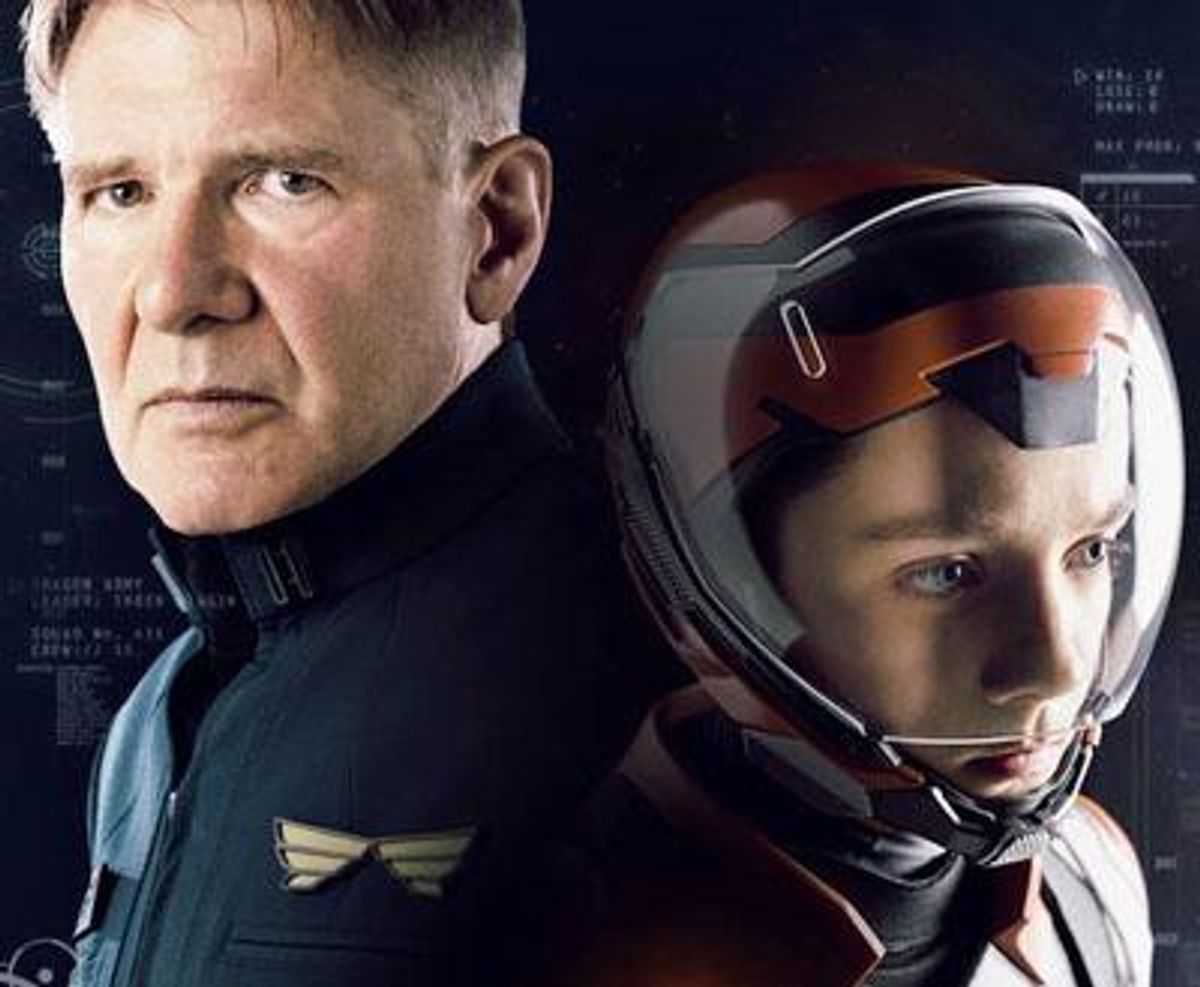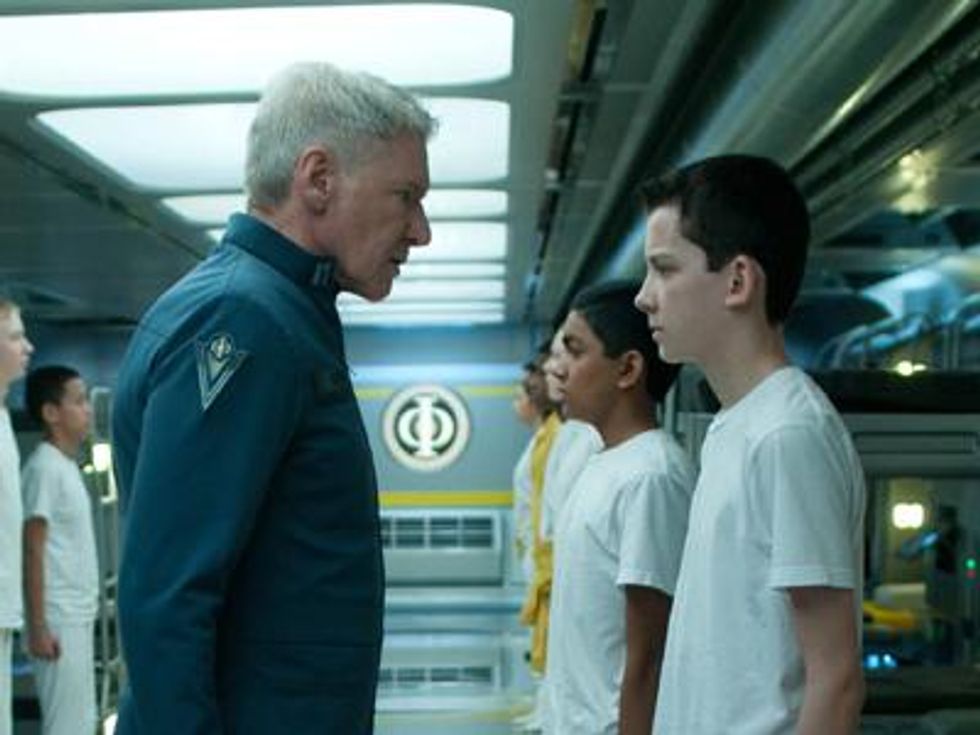
Despite the antigay views of Orson Scott Card, his most popular novel is an empowering story for LGBT youth.
July 31 2013 7:00 AM EST
November 17 2015 5:28 AM EST
By continuing to use our site, you agree to our Private Policy and Terms of Use.

"It's dreadfully ironic," says Gavin Hood, director of the forthcoming film adaptation of Orson Scott Card's iconic sci-fi novel Ender's Game. "Orson wrote a book about compassion, and empathy, and yet he himself is struggling to see that his position in real life is really at odds with his art."
When Hood set out to bring the science fiction classic to the big screen, he had no idea the movie would become a flashpoint in the battle for LGBT equality. "Frankly, that's not unusual," he continues. "Great art usually rises above the weaknesses and failings of its creators."
Nevertheless, the antigay views of Card, a man who once sat on the board of the National Organization for Marriage, and called for the criminalization of homosexuality, have begun to eclipse any merit his award-winning story may offer to Hollywood's pantheon of science fiction films.
The organization Geeks OUT launched its Skip Ender's Game campaign in July, urging supporters of LGBT equality to boycott the film when it lands in theatres on November 1, in hopes of sending a message that moviegoers will not tolerate antigay activism. It's a viewpoint Hood agrees with on a personal level, but he's quick to point out the controversy now surrounding the film provides an even greater opportunity to positively affect the future of LGBT equality, thanks to the conversation it sparked.
"I fully understand the position of those seeking a boycott. I really do," says Hood. "However, let us have the conversation for what it is, which is that it's so ironic that the themes and positions in the film are completely the opposite of what its author is now saying. I think that is a healthy and important discussion to have on those terms. I would far rather engage in a debate from an honest point of view, than have it suggest that audiences may stay away."
Those who call for a boycott of Ender's Game may note that their motivation has more to do with the artist than the art. After all, it's difficult to support a story from which an antigay activist like Card profits. But the effect of one of Card's most celebrated works may actually be to advance the message of equality.
Long before Card's personal views on homosexuality made headlines, many LGBT fans who read Ender's Game were enamored with the story. Not only is the tale a great work of science fiction, but protagonist Ender Wiggin's struggles also closely parallel a number of common experiences had by gay youth.
As the third child in his family, Ender is born an outsider in a society with strict population control laws. Though his birth is a special case approved by a government desperate to find the ultimate military leader, he still carries the shame associated with being a "Third" in a culture which enforces a two-child limit. "No one wants a Third anymore," Colonel Graff says to Ender in the novel. "[Your parents] do love you Ender, but you have to understand what your life has cost them. They were born religious."

With the exception of his sister, Valentine, Ender shows no affection toward females throughout the book. Though he does build a friendship with Petra, the only girl named at the Battle School he attends, their relationship is purely platonic.
Instead, he is most affectionate with his male peers like Alai, who kisses Ender on the cheek after a private exchange between the two boys one night in the barracks, and Bean, whom in turn appears to have deep affection for Ender as well.
Additionally, a number of boys in the Battle School who clash with our young hero seem to hone in on Ender's queer sensibilities by the ways in which they choose to bully him. In one scene, the character Rose de Nose lays naked on a bed as he taunts Ender with an animated, wagging penis displayed on the computer tablet resting across his waist.
But are the people behind the film aware of just how easily Ender's Game can be interpreted as a queer story?
"No doubt about it," says producer Roberto Orci. "When I read the book, I was kind of a geeky kid. I was less of an athlete and more of a student. I definitely experienced bullying, and so I can totally imagine how Ender's journey would relate to anyone in similar circumstances, be it being bullied for the things that I was bullied for, or for who they are. I think the movie reflects that journey as well."
Hood notes that no matter what Card believes, the people who created the upcoming film resonated with what he actually wrote.
"The story of Ender is really a young person in search of his identity and in search of his own moral compass," says Hood. "And so for me, it is so ironic that the writer of the work that has helped so many [young] people, gay and straight, to find empowerment, to feel empowered, to find their own moral compass -- it's very sad that he, himself, is struggling with these issues. But that doesn't take away from the fact that in struggling with these issues, he wrote a great book. I think what would be far more helpful is if audiences knew that the makers of this film, and the film itself, holds the polar opposite point of view to the current thinking of Orson Scott Card on gay issues."
That self-reflective irony is a sentiment echoed loud and clear by Harrison Ford, who plays the part of Colonel Graff in the upcoming film. "The question of gay marriage is a battle that [Card] lost," he says. "I think we all know that we've all won. That humanity has won."
"Regardless of its author's clearly bigoted point of view on gay marriage and homosexuality, this book was worth bringing to the screen," says Hood. "The irony is that we would not be having this conversation if we hadn't made Ender's Game, and that's the way you change societies, when you engage in meaningful conversation. So I'm thrilled we're having this conversation and it really does raise the very tricky question of, 'Is art something that we can view of independent of its creator?'"
"As stressful as this is, it's achieving, in a twisted way, exactly what we set out to do," Hood says. "And wouldn't it be amazing if we could turn this thing into what the book is really about?"